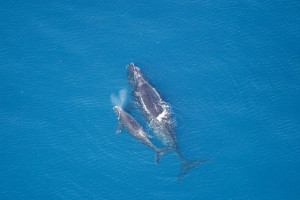We have much more to do and your continued support is needed now more than ever.
Right Whales Hold Their Seat at the Table while Offshore Wind Power Moves Forward in New England

Today’s agreement builds on an earlier collaborative effort in the Mid-Atlantic region, where Deepwater Wind and several other offshore wind developers committed to measures to protect whales from underwater noise and shipping traffic during the developer’s site assessment and characterization activities. Last July, Deepwater Wind won the Interior Department’s competitive lease auction for the 256 sq. mi. Rhode Island-Massachusetts Wind Energy Area, and today’s agreement ensures that whales will be protected as the pre-development work to design a project unfolds in this area.
Why is this exciting?
1. America needs to rapidly increase our use of renewable energy in order to protect all wildlife from the dangers of a warming world.
Just yesterday, the release of the third report of The National Climate Assessment underscored the urgency of the climate threat and continued sounding the alarm for wildlife, habitat, and future generations. NWF’s senior global warming specialist Patty Glick responded:
Compared to previous projections, we’re seeing temperatures rising faster, oceans more quickly becoming acidic, fish and wildlife habitat shifting sooner than many species can adapt.
That we’re seeing so many changes so rapidly is a call to act now to prevent these changes from overwhelming us in the future. We must confront the underlying cause of climate change by cutting carbon pollution, investing in clean energy and saying no to dirty energy.
Offshore wind power is a massive clean energy source just waiting to be tapped. We have a staggering supply of carbon-free energy off our shores, and always will. The technology is advanced, thanks to two decades of lessons learned in Europe, and is already producing over 6,000 megawatts and 58,000 jobs overseas. A robust offshore wind industry in the US will provide much-needed clean power when and where we need it most, offering a unique opportunity to diversify our energy mix and spur economic development opportunities in both coastal and inland communities. In the shadow of the National Climate Assessment’s sobering reminders, a visionary commitment to harnessing the incredible clean energy resource off our Atlantic coast is more important than ever.
2. Our treasured coastal and marine wildlife will receive the careful protection they deserve during offshore wind power development.

Endangered species protection is a matter National Wildlife Federation takes very seriously. With fewer than 500 right whales remaining, offshore wind development can and must include strict right whale protections. Today, we commend Deepwater Wind for continuing to lead the way as we work to ensure that strong wildlife protections guide our pursuit of offshore wind power.
3. Congress has an opportunity to spur clean energy forward.
Deepwater Wind’s commitment is a shining example of how offshore wind development and wildlife conservation are compatible, but securing a lease and beginning surveys is only part of the puzzle. To keep making strides requires our leaders on Capitol Hill to do their part, to recognize the significance of this resource, in this moment, and provide the stable investment market every industry needs to get rolling. Yes, we have climate urgency. We also have a solution at the ready, offering an unmatched opportunity to diversify our energy supply with a massive source of local, clean power, with a developer pledging environmental integrity from start to finish.
American needs to seize this moment. We need to call on Congress to finally extend the investment tax credit for offshore wind. And we need public support to ring loud and clear until we are harnessing those winds at the tremendous scale they have to offer. Cheers to today’s success, and its contribution to tomorrow’s progress.
![]() Call on Congress to do their part to protect right whales and extend tax credits that can help us reach a clean energy future!
Call on Congress to do their part to protect right whales and extend tax credits that can help us reach a clean energy future!





















